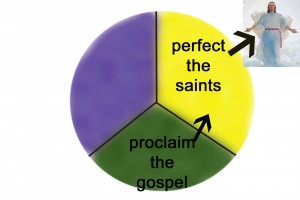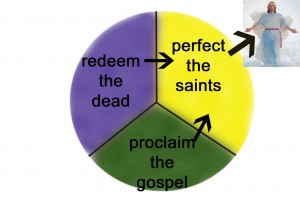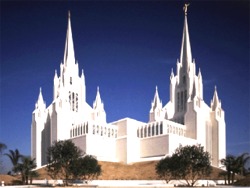Verily, this is fasting and prayer, or in other words, rejoicing and prayer
Usually, members of the Church of Jesus Christ of Latter-Day Saints abstain from two consecutive meals on the first Sunday of every month (yesterday).  That Sunday church service is designated for witnessing or bearing testimony of the truthfulness of the gospel of Jesus Christ by the members of the congregation. Besides abstaining from food and drink and attending testimony meeting, a true fast also consists of giving a fast offering to care for those in need. The offering, the sum of money that would have been spent on the two skipped meals, is given to the Bishop for any members who are struggling.
That Sunday church service is designated for witnessing or bearing testimony of the truthfulness of the gospel of Jesus Christ by the members of the congregation. Besides abstaining from food and drink and attending testimony meeting, a true fast also consists of giving a fast offering to care for those in need. The offering, the sum of money that would have been spent on the two skipped meals, is given to the Bishop for any members who are struggling.
The scientific community has caught up with the religious practice and has proven that fasting helps prevent heart disease, speeds up metabolism, gives us more energy and helps our digestive organs run better by giving them a little bit of a break. The LDS church does not recommend fasting too often or for an extended amount of time. A 24 hour fast once a month is what is recommended.
Two prominent reasons for fasting are to improve physical conditions and spiritual development. President Heber J. Grant describes some of the physical blessings of fasting by writing, “Let me promise you here today that if the Latter-day Saints will honestly and conscientiously from this day forth, as a people, keep the monthly fast and pay into the hands of their bishops the actual amount that they would have spent for food for the two meals from which they have refrained . . . we would have all the money necessary to take care of all the idle and all the poor” (Gospel Standards, comp. G. Homer Durham (1941), 123).
 Isaiah notes the spiritual benefits and lists them in the 58th chapter of his book. When we obey the law of the fast he says, “Then shall thy light break forth as the morning, and thine health shall spring forth speedily: and thy righteousness shall go before thee; the glory of the Lord shall be thy rereward [or rearguard]. Then shalt thou call, and the Lord shall answer; though shalt cry, and he shall say, Here I am.” We are promised better health, protection, that we will be closer to the Spirit of the Lord and that the Lord will hear and answer our prayers.
Isaiah notes the spiritual benefits and lists them in the 58th chapter of his book. When we obey the law of the fast he says, “Then shall thy light break forth as the morning, and thine health shall spring forth speedily: and thy righteousness shall go before thee; the glory of the Lord shall be thy rereward [or rearguard]. Then shalt thou call, and the Lord shall answer; though shalt cry, and he shall say, Here I am.” We are promised better health, protection, that we will be closer to the Spirit of the Lord and that the Lord will hear and answer our prayers.
Fasting is regularly employed when trying to discover answers to our questions. In The Book of Mormon the prophet Alma testifies of the life and sacrifice of Jesus Christ, the goodness of God and the reality of the Plan of Salvation to the people living in the land called Zarahemla. As he concludes his teachings he proclaims, “Do ye not suppose that I know of these things myself? Behold, I testify unto you that I do know that these things whereof I have spoken are true. And how do ye suppose that I know of their surety? Behold, I say unto you they are made known unto me by the Holy Spirit of God. Behold, I have fasted and prayed many days that I might know these things of myself. And now I do know of myself that they are true; for the Lord God hath made them manifest unto me by his Holy Spirit” (Alma 5:45-46).
Growing up in an LDS home, skipping breakfast before church was expected on the first Sunday of the month, but it wasn’t until I was a teenager that I finally recognized what I could accomplish if I actually fasted and prayed. When I decided that I really wanted to know of the truthfulness of the gospel for myself, I fasted and prayed a couple of times a month to gain the witness that God exists, that He knows who I am, that The Bible is correct, that The Book of Mormon is a true account of Jesus Christ’s ministry in America, that Joseph Smith restored the original church back to the Earth and that the current prophet Thomas Spencer Monson is truly called by God to lead us at this time. Prayers alone were not enough. I know that the answers I received and still receive are possible because fasting and prayer help me to be closer to Heavenly Father and Jesus Christ.

Because I have had those experiences in the past, I feel comfortable fasting and praying when I need more guidance in my life now. I often fast and pray for help during stressful times in the school year, at times when I have to make serious choices about my future and especially times when I recognize the need to change my attitudes and habits (all too often). Changes in character are some of the hardest changes to make, but through the strength I receive when I fast and pray I know that I need to and that I can cut away some of my flaws.
 When I lived in Uganda last summer I fasted for a number of reasons. I went there to do humanitarian work and “change the world!” I wanted Heavenly Father to show me what I could do that would make the most meaningful impact on the people I worked with. Thinking I could change things or fix problems was incredibly prideful, but I really wanted to make a difference. The biggest difference, of course, was with myself. The scriptures tell us to feed the hungry, heal the sick, clothe the naked, etc., but I have never seen such practical application in my life. Everyone I knew in the U.S.A. had at least five pairs of shoes, plenty of food in the pantry and access to medical attention, but in Lugazi? No. It was while I was walking up and down dirt roads, having little kids who wore the same shirt everyday run up in their bare feet and grab my hands that I realized why we are asked to fast. Not everyone can have the experience I did in East Africa, but fasting gives people everywhere that little taste of discomfort that is so common around the world. It helps us to realize that there is so much work for us to do while Christ is away.
When I lived in Uganda last summer I fasted for a number of reasons. I went there to do humanitarian work and “change the world!” I wanted Heavenly Father to show me what I could do that would make the most meaningful impact on the people I worked with. Thinking I could change things or fix problems was incredibly prideful, but I really wanted to make a difference. The biggest difference, of course, was with myself. The scriptures tell us to feed the hungry, heal the sick, clothe the naked, etc., but I have never seen such practical application in my life. Everyone I knew in the U.S.A. had at least five pairs of shoes, plenty of food in the pantry and access to medical attention, but in Lugazi? No. It was while I was walking up and down dirt roads, having little kids who wore the same shirt everyday run up in their bare feet and grab my hands that I realized why we are asked to fast. Not everyone can have the experience I did in East Africa, but fasting gives people everywhere that little taste of discomfort that is so common around the world. It helps us to realize that there is so much work for us to do while Christ is away.

For me, the most important thing about fasting is that we follow Christ’s example of feeding the hungry, clothing the naked, satisfying the afflicted, becoming closer to our Father in Heaven, and learning to understand the answers we are given. That is how we should act toward each other and toward Heavenly Father and Jesus Christ. When we do those things, fasting really is a cause for rejoicing.
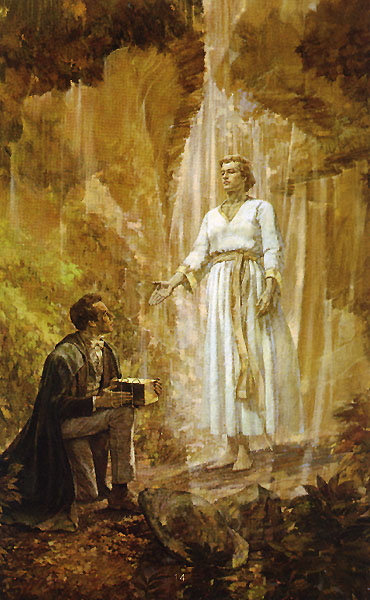
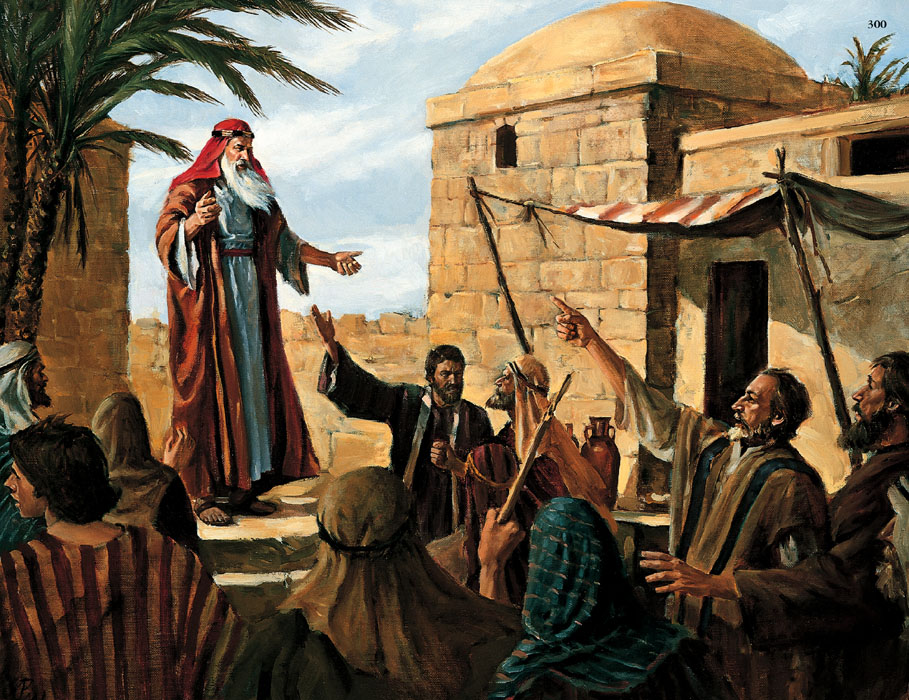 Nephi tells the story of his father, Lehi, and his vision. Much the same way that Isaiah, Jeremiah and Ezekiel were called to be prophets, Lehi sees a vision of God, learns of His gospel and is sent among the people to warn them of their wickedness and the impeding doom of the city. Predictably, he is rejected by the people and threats are made on his life (
Nephi tells the story of his father, Lehi, and his vision. Much the same way that Isaiah, Jeremiah and Ezekiel were called to be prophets, Lehi sees a vision of God, learns of His gospel and is sent among the people to warn them of their wickedness and the impeding doom of the city. Predictably, he is rejected by the people and threats are made on his life ( Some time after arriving, Lehi gives his
Some time after arriving, Lehi gives his 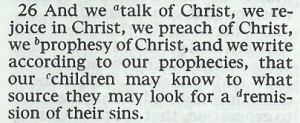 The most remarkable thing about these writings is how much Nephi and his descendants knew about the coming Messiah. Nephi was shown the birth of Jesus in a
The most remarkable thing about these writings is how much Nephi and his descendants knew about the coming Messiah. Nephi was shown the birth of Jesus in a 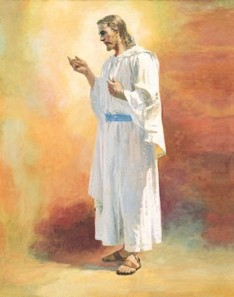 …was the Word, and the Word was with God, and the Word was God. The same was in the beginning with God. All things were made by him; and without him was not any thing made that was made.” (
…was the Word, and the Word was with God, and the Word was God. The same was in the beginning with God. All things were made by him; and without him was not any thing made that was made.” (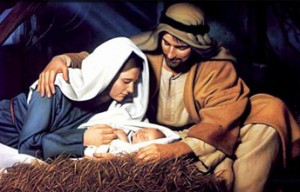 Mary, a virgin maiden from Nazareth became miraculously pregnant: an angel appeared to her and said, “Behold, thou shalt conceive in thy womb, and bring forth a son, and shalt call his name JESUS.” (
Mary, a virgin maiden from Nazareth became miraculously pregnant: an angel appeared to her and said, “Behold, thou shalt conceive in thy womb, and bring forth a son, and shalt call his name JESUS.” ( He knew His execution was imminent, but something weightier was on His mind: the souls of all people. He had been chosen by the Father to be the sacrificial lamb — to atone for the sins of mankind. He prayed long and hard in the garden of Gethsemane that fateful night. At first He hesitated, pleading for some other way, “Father, if thou be willing, remove this cup from me: nevertheless not my will, but thine be done.” (
He knew His execution was imminent, but something weightier was on His mind: the souls of all people. He had been chosen by the Father to be the sacrificial lamb — to atone for the sins of mankind. He prayed long and hard in the garden of Gethsemane that fateful night. At first He hesitated, pleading for some other way, “Father, if thou be willing, remove this cup from me: nevertheless not my will, but thine be done.” (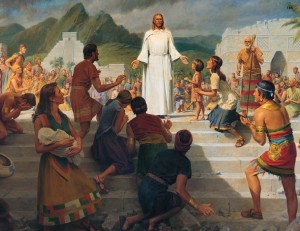
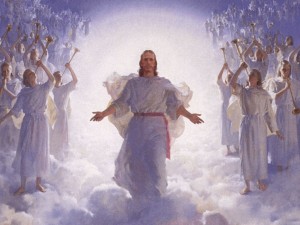
 As a teenager, one of the things we were taught over and over was that the Church had a three-fold mission:
As a teenager, one of the things we were taught over and over was that the Church had a three-fold mission: 
